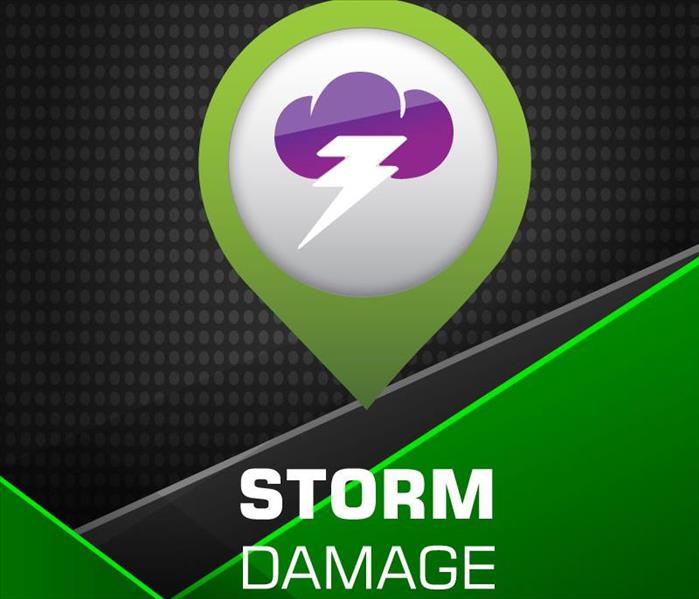Thunder, Lightning & Severe Weather - Be Prepared Before, During & After The Storm.
7/13/2021 (Permalink)
Thunderstorms can be quite destructive, producing lightning, hail, high wind, flash floods or even tornadoes.
What do we know about thunderstorms? A thunderstorm is classified as a severe if it contains large (at least one inch) hail and/or winds of at least 58 MPH. If you can hear thunder, you are close enough to be affected by lightning-every thunderstorm produces lightning. Lightning can strike up to 10 miles ahead of or following a storm. Thunderstorms can occur by themselves, in clusters, or in lines. The typical thunderstorm is 15 miles in diameter and produces heavy rain for 30 minutes to an hour. The heavy rain associated with thunderstorms can cause flash floods. Their high winds can blow down trees, damage homes and knock out utility poles and wires causing wide spread power outages.
Why Prepare? Thunderstorms occur in most places, year-round and at any hour. That being said, Thunderstorms are VERY common in the spring and summer months throughout New England. Mass.gov sites, 10-30 days of thunderstorms each year. These storms can be extremely destructive and dangerous. This is why it is best to be prepared.
We’ve broken down the following preparedness tips into before, during and after thunderstorms.
Preparing BEFORE Thunderstorms
- Be informed. Learn about your local community’s emergency warning system for severe thunderstorms
- Discuss thunderstorm safety and lightning safety with the members of your household
- Create an emergency plan so that you and your family know what to do, where to go and what you will need to protect yourselves from the effects of a thunderstorm.
- Protect your animals by ensuring that any outside buildings that house them are protected in the same way as your home
- Put together an emergency preparedness kit
- If you have a basement or lower level of your property prone to flooding, buy and install sump pumps with back-up power.
- If you already have a sump pump, check regularly to make sure it is functioning properly.
- Clear clogged rain gutters to allow water to flow away from your home
- Cut down or trim trees that may be in danger of falling on your home.
- Review your insurance policies to see if you have adequate coverage. If you’re not sure you have enough coverage, talk to your agent or company.
Staying Safe DURING Thunderstorms & Severe Weather
- Pay attention to alerts & warnings.
- Watch for signs of a storm, like darkening skies, lightning flashes or increasing wind.
- If you can hear thunder, you are close enough to be in danger from lightning. If thunder roars, go indoors!
- Avoid using electronic devices connected to an electrical outlet.
- Avoid running water- Do not take a bath, shower or use plumbing.
- Postpone outdoor activities if thunderstorms are likely to occur.
- If you are outside and cannot reach a safe building, avoid high ground; water; tall, isolated trees; and metal objects. Picnic shelters, dugouts and sheds are NOT safe.
- Do not drive through flooded roadways. Just six inches of fast-moving water can knock you down, and one foot of moving water can sweep your vehicle away. Turn Around. Don’t Drown!
What To Do AFTER the Storm
- Monitor media for updated emergency information and public safety announcements.
- Stay away from downed power lines and report them immediately.
- Keep close watch on your animals. Keep them under your direct control.
- Check your home for damage:
- If you believe there is a gas leak, go outdoors immediately, and do not turn electrical switches or appliances on or off.
- If your home or property is damaged, take photos or videos to document your damage, and contact your insurance company.
- If your power is out, report power outage to utility company.
- Remember “Turn Around, Don’t Drown!” Don’t drive through flooded roads
Who should you call if your property is affected by storms and flooding? SERVPRO Storm Damage Cleanup and Restoration
SERVPRO® of Shrewsbury / Westborough has experience restoring homes affected by storms and flooding. We can respond immediately with highly trained technicians who employ specialized equipment and techniques to restore your home or business back to pre-storm condition.
Have Storm or Flood Damage? Call Us Today (508) 393-7898
Resources:





 24/7 Emergency Service
24/7 Emergency Service
